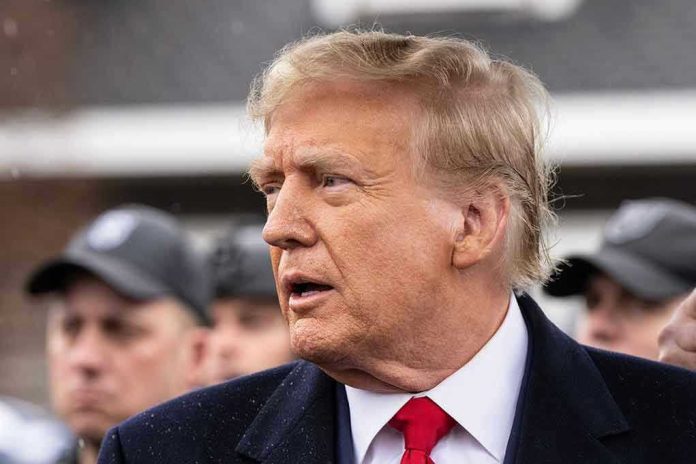
Trump’s direct call to block the Epstein vote has ignited fierce debate in Congress, putting GOP unity, transparency, and public trust to the ultimate test.
Story Snapshot
- President Trump urges Rep. Lauren Boebert and key GOP lawmakers to oppose a congressional vote on Epstein-related transparency.
- GOP hardliners rally in response, delaying or threatening the measure’s passage amid mounting public scrutiny.
- Trump’s intervention showcases his enduring hold over the Republican caucus and shapes the legislative agenda on hot-button issues.
- The episode intensifies partisan divides over elite accountability and government openness in the Epstein scandal.
Trump’s Intervention: Mobilizing GOP Opposition to the Epstein Vote
Former President Donald Trump’s outreach to Rep. Lauren Boebert and other House Republicans has reshaped the political landscape surrounding the scheduled vote on releasing further Epstein-related documents.
Trump’s maneuver signals a determination to protect both party interests and his own legacy, using his influence to galvanize opposition to the measure.
The move has drawn a clear line in the sand, with Trump-aligned lawmakers responding swiftly to his call, presenting unified resistance and creating immediate procedural hurdles for the scheduled vote.
Public attention on the Epstein case remains intense, with voters on both sides demanding answers about powerful individuals potentially implicated in sealed documents.
Trump’s decision to intervene has become a flashpoint, heightening scrutiny of the motivations behind GOP resistance and amplifying the stakes.
Rep. Boebert has echoed Trump’s perspective, calling the vote “politically motivated” and arguing that Democrats are weaponizing tragedy for partisan gain, further rallying the party’s base around themes of fairness and due process.
Transparency, Accountability, and the Struggle for GOP Unity
The GOP caucus faces internal divisions, as some members express discomfort with blocking transparency on such a high-profile issue. Pressure from Trump and his supporters, however, has made open dissent politically risky for lawmakers who rely on Trump’s endorsement and base support.
House Democrats, meanwhile, have seized on the moment to frame the issue as a test of government openness and elite accountability, intensifying the partisan clash. The resulting standoff has delayed the vote and thrown the legislative process into uncertainty, demonstrating how ex-presidential influence can override institutional norms.
Trump’s intervention is not without precedent, as he has previously lobbied Republican lawmakers on contentious matters ranging from impeachment to high-profile investigations.
In this instance, however, the stakes are magnified by public fascination with the Epstein scandal and bipartisan demands for transparency. The case has become a symbol of the broader struggle over who wields power in Washington and whether the government will prioritize the interests of ordinary Americans or protect the privileged few.
Broader Implications: Public Trust, Precedent, and Partisan Polarization
The immediate impact of the GOP’s resistance is heightened partisan tension and a delay in transparency efforts. In the long term, experts warn this episode risks further eroding public trust in Congress and sets a precedent for direct ex-presidential intervention in legislative affairs.
For conservative voters, the situation underscores deep skepticism toward efforts that appear to target Trump and his allies under the guise of accountability.
Many see the push for more Epstein disclosures as a political stunt, while progressives and transparency advocates argue that full disclosure is essential for justice.
The controversy is likely to reverberate into the 2026 midterms, shaping narratives about party loyalty, government transparency, and the meaning of accountability in American democracy.
Sources:
The New York Times, “Trump Presses GOP to Block Epstein Vote,” Nov 2025.
Politico, “Boebert Leads GOP Push Against Epstein Resolution,” Nov 2025.
AP News, “House Delays Epstein Vote Amid GOP Resistance,” Nov 2025.
Brookings Institution, “Trump’s Post-Presidency Influence,” 2025.
Harvard Law Review, “Transparency and Accountability in High-Profile Cases,” 2025.
Georgetown Ethics Center, “Congressional Oversight and Ethical Precedents,” 2025.




